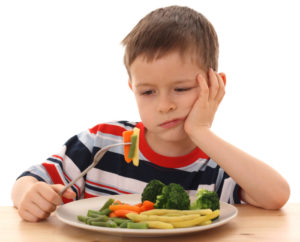Why Are Vegetables So Important?
Eat your vegetables! Eat your vegetables! Eat your vegetables! You probably heard that a lot from your mom when you were growing up. Mom was right, eating your vegetables is very important. In fact, it’s one of the most important things you can do to improve your health.

But hey, you’re all grown up now, right? That means you don’t have to listen to your mom. Turns out very few of us are taking mom’s wise advice because we are not eating our vegetables. According to the Center for Disease Control, only 7% of Americans eat the recommended 2 to 3 cups of vegetables a day, and the vegetable we eat the most is potatoes fried in vegetable oil.
So why are vegetables so important? Vegetables are nutrient dense foods; they provide a lot of vitamins, minerals and phytochemicals in relation to the number of calories they contain. Phytochemicals are biologically active compounds in foods that provide resistance against diseases, especially cancer and cardiovascular disease.
There is a lot of speculation about what causes chronic diseases like cardiovascular disease and cancer. One of the most common theories for both of these diseases is oxidative stress. Oxidative stress is an imbalance between free radicals and antioxidants in your body. A free radical is an oxygen-containing molecule that has lost an electron. Since electrons like to hang out in pairs, the lone electron in a free radical will do whatever it takes to find a partner. This usually means stealing an electron from a healthy cell like a fatty acid, DNA, protein or cholesterol. This sets off a destructive chain of electron stealing. The end result can be cell membrane damage, cellular protein damage, DNA damage, oxidation of LDL cholesterol and inflammation.
This all sounds like bad stuff, right? So, what protects us from all this damage? Most of the time antioxidants like vitamins C and E, beta-carotene, and phytochemicals neutralize free radicals by donating one of their own electrons, ending the electron stealing reaction.
Oxidative stress occurs when the production of free radicals outpaces the body’s ability to neutralize them and counteract their harmful effects with antioxidants. Some free radicals are produced as part of the body’s normal metabolic processes, and sometimes the immune system will produce free radicals as a way to attack and kill pathogens. But if free radical production becomes excessive over an extended period of time, and antioxidants are in short supply, damage to healthy cells and tissues occurs. Excessive oxidative stress can lead to numerous pathophysiological conditions in the body. Some of these include neurodegenerative diseases such as Parkinson’s and Alzheimer’s, gene mutations and cancers, chronic fatigue syndrome, heart and blood vessel disorders, heart failure, heart attack and inflammatory diseases.

So, antioxidants seem to be our best defense against most chronic diseases. If that’s the case then why not load up on antioxidants like vitamins C and E, beta-carotene and phytochemicals in the form of a pill or powder? Whole foods and diets composed of them, not single nutrients, are most beneficial in the prevention of cancer. When you uncouple vitamins from their food matrix, your body handles them differently.
Several years ago, studies confirmed that people who eat vegetables rich in beta-carotene have low rates of certain cancers. Because of this, researchers began focusing on beta-carotene, while supplement makers began promoting it as a powerful anti-cancer substance. Consumers eagerly bought and took beta-carotene supplements. But then something happened—clinical trials around the world were abruptly stopped when scientists noticed a 28% increase in lung cancer among smokers taking beta-carotene compared with a placebo. Beta-carotene supplements are no longer recommended.
Nutrition scientists have become very skilled at making elemental diets—life-saving liquid diets of precise chemical composition for hospital patients and others who cannot eat ordinary food. But, even if a person’s basic nutrient needs are perfectly understood and met, concoctions of nutrients still lack something that foods provide. Hospitalized clients who are fed nutrient mixtures through a vein improve dramatically when they can finally eat food. There is something about real whole foods that is important to our health, but what is it?
The truth is there are literally thousands of unique antioxidant compounds in plants, most of which haven’t been discovered yet. So, while scientists can produce life-saving nutritional formulas, there is nothing that will improve our health more than a wide variety of vegetables. And, this same logic applies to all of the nutrients in fruit, too. Both vegetables and fruits are vital to keeping your body thriving and healthy. Eating at least 6 servings of fruits and vegetables a day will dramatically reduce risks for all types of cancers. Also, each additional serving of fruits and vegetables reduces the risk even more.
Eat your vegetables! Wise advice from your mom.
Stay Strong,
Bo Railey

